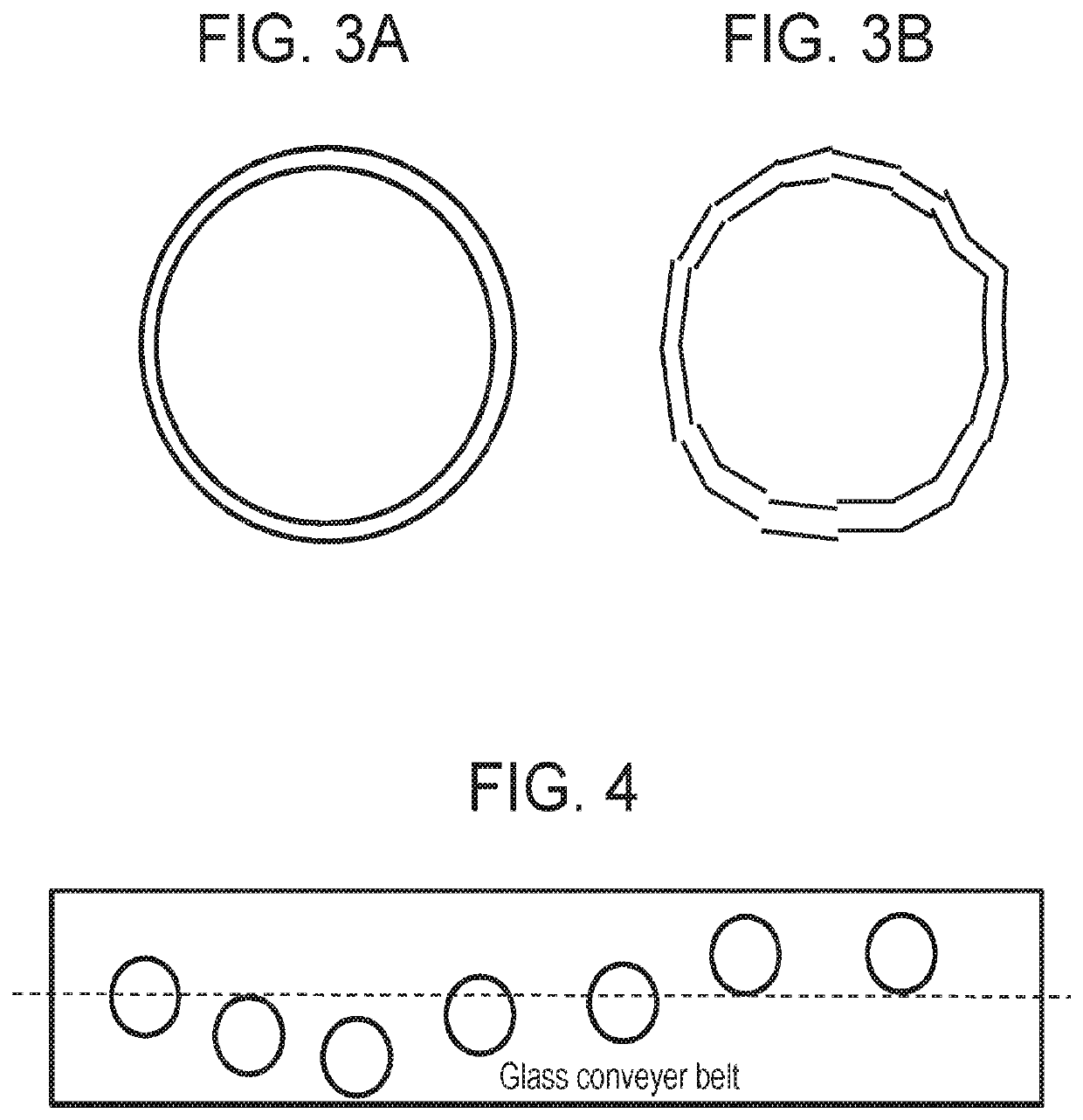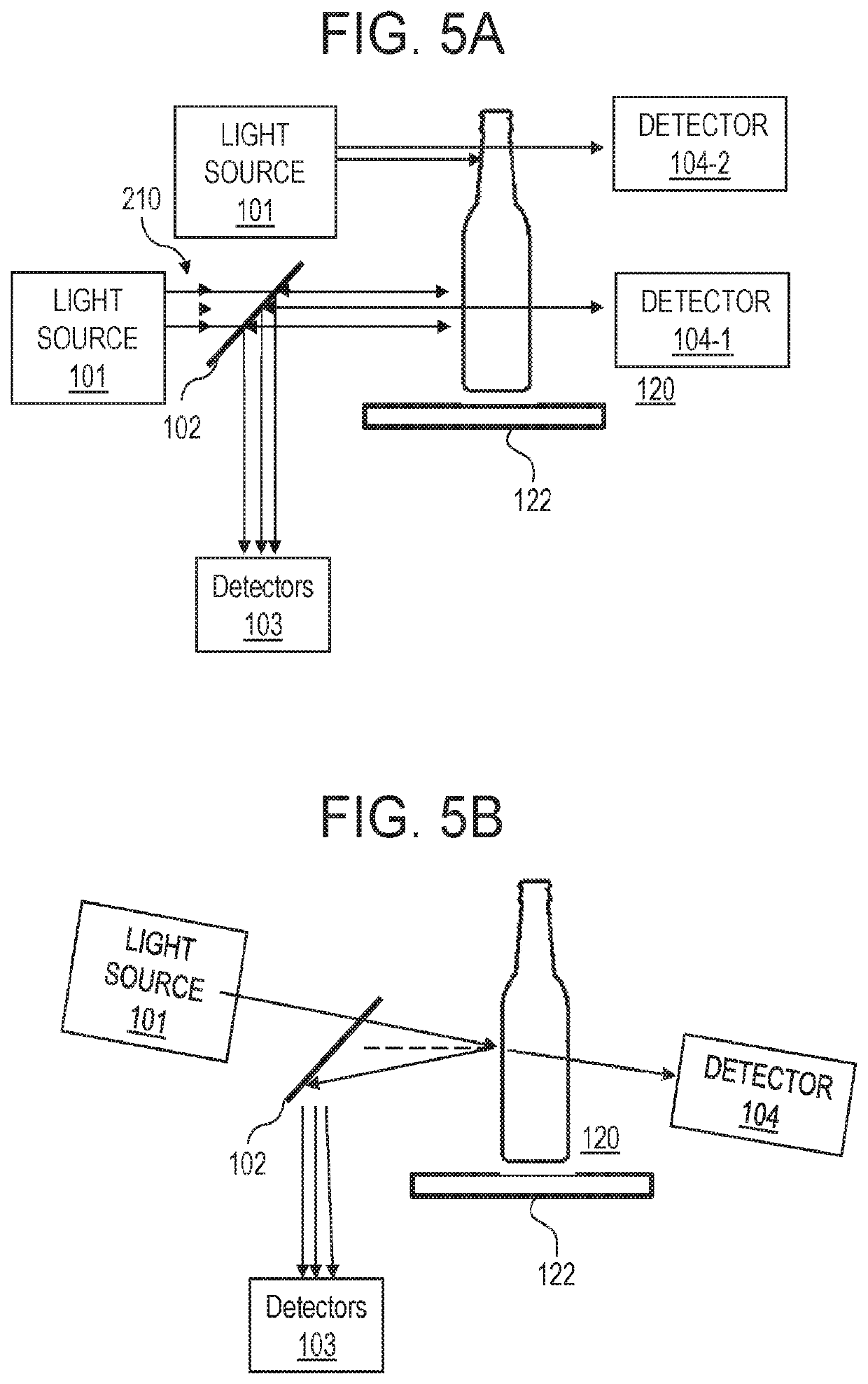Object position independent method to measure the thickness of coatings deposited on curved objects moving at high rates
a technology of moving containers and coatings, applied in the direction of optically investigating flaws/contamination, color/spectral properties measurement, instruments, etc., can solve the problem that the technique is substantially insensitive to ambient light, and achieve the effect of accurate coating thickness measurement and fast detection
- Summary
- Abstract
- Description
- Claims
- Application Information
AI Technical Summary
Benefits of technology
Problems solved by technology
Method used
Image
Examples
example 1
[0066]A light source (101) that may be an LED laser light source (404.6 nm) using a special assembly is directed on the surface of a moving container object. In some instances, it can pass through a beam splitter as shown in FIG. 5A at close to 90 degree angle to the surface of the bottle. In some instances, the laser light can be directed at the container surface at small angle of 0 to 15 degrees to the normal drawn at the container surface with, FIG. 5 B. In some instances of this invention, a detector measuring transmittance of this light is placed behind the container, 104. In some instances, redirection and / or collection optics are used to direct reflected light from the container towards fast detectors. In some cases, the light of a narrow wavelength and / or a series of light sources of narrow wavelength are directed through a hole in a parabolic mirror alignment / collection system, FIG. 6. These light sources may be directed at different angles to the normal of the container su...
example 2
[0069]Using setup similar to that described in Example 1 and without separation of multiple reflections, amber bottles having coating thickness previously measured by standard AGR meter were measured at variable distance from the optical collection / redirection system and the bottle surface. Correlation of the known AGR coating thickness with thickness measured by non-contact detection system of this invention was calculated over two different detector-to-bottle distance ranges. For close detector distance range (7-32 mm) the correlation had R2 value of 98.4%. For farther detector distance range (150-185 mm) the correlation between the two measurements had R2 value of 97.9%. Thus, using current invention similar coating thickness measurement results are readily obtained when detector is up to 20 cm away from bottle as when detector is nearly in contact with container (<1 cm).
example 3
[0070]Several examples of optically calculated coating thickness based on the average intensity of the wavelength channels are presented in FIG. 15 A for reflected light. The data were generated using custom program based on Jones matrix formalism and dispersion parameters of SnO2 coatings on flat soda lime substrates. The thickness of the SnO2 coatings were converted from nanometers into CTU using known conversion relationship (3.45 CTU=1 nm). Four non-polarized wavelength channels are presented in this figure, having peak intensity at 325, 454, 545 and 663 nm were considered. The width for each channel was selected at 1 nm. It is clear that based on the dispersion parameters of the tin dioxide coatings, the intensity of the reflected light increases with the increasing thickness of the coatings, between 0 and 50 CTU. The biggest increased is demonstrated using a 325 nm wavelength channel. For example, maximum to minimum ratios for 325, B, G and R wavelength channels were 3.7, 1.73...
PUM
| Property | Measurement | Unit |
|---|---|---|
| thickness | aaaaa | aaaaa |
| thickness | aaaaa | aaaaa |
| thickness | aaaaa | aaaaa |
Abstract
Description
Claims
Application Information
 Login to View More
Login to View More - R&D
- Intellectual Property
- Life Sciences
- Materials
- Tech Scout
- Unparalleled Data Quality
- Higher Quality Content
- 60% Fewer Hallucinations
Browse by: Latest US Patents, China's latest patents, Technical Efficacy Thesaurus, Application Domain, Technology Topic, Popular Technical Reports.
© 2025 PatSnap. All rights reserved.Legal|Privacy policy|Modern Slavery Act Transparency Statement|Sitemap|About US| Contact US: help@patsnap.com



